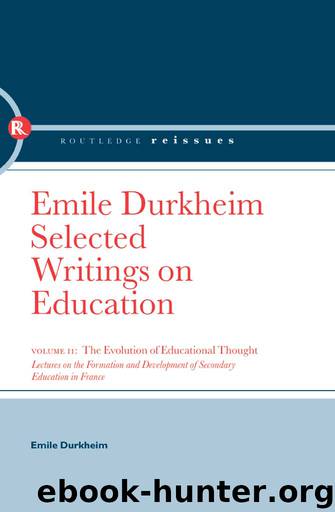The Evolution of Educational Thought by Durkheim Emile;

Author:Durkheim, Emile; [Durkheim, Emile]
Language: eng
Format: epub
ISBN: 1541289
Publisher: Routledge
part two
chapter 15
The Renaissance (I)
Rabelais or the encyclopaedic movement
The principal characteristic of the period that we have just studied is, as we have seen, its admirable richness in matters of academic organisation: it is to that period that we owe the principal organs of our educational system. The contribution of the new epoch which we are now going to enter is of a completely different nature. The Renaissance is the era during which was elaborated the educational ideal by which France lived, to the exclusion of all others, from the sixteenth to the end of the eighteenth century, and which, in more moderate form, still survives today alongside the new kind of academic system which has been struggling for some fifty years to get itself established. It was in schools informed by this ideal that were formed the basic traits of our national mentality as these emerged from the seventeenth century onwards, in other words, of our classical mentality. There is thus no need to point out the interest of the problem. It is the still controversial question of classical education with which we shall be dealing. Only, instead of treating it dialectically and analysing the totally subjective idea that each one of us may have of it, we shall begin by investigating objectively how this system of education was formed, what causes brought it into being, what was its nature, what influence it had on our intellectual evolution, all of which research is indispensable if one is to judge, with a full knowledge of the causes, what it was destined to become in the future.
The ideal whose beginnings we shall be attempting to trace presents itself, from the time of its first appearance in history, in a very definite form which is worthy of note. It is not the continuation and development of the various ideals pursued in preceding centuries, but quite the opposite: from the first it stresses dramatically its antagonism to them. The Renaissance in terms of educational theory marks a hiatus in our mental evolution, a break with the past. In one sense, it is the beginning of something completely new. This is ingeniously expressed by Rabelais in an allegory from Pantagruel. When Gargantua, having been for some time brought up according to the doctrine of the teachers from the Sorbonne, was finally entrusted to the guidance of Panocrates, who to Rabelais represented the spirit of the Renaissance, his new master’s first concern was to purge his pupil’s mind ‘ canonically’ in order to cleanse him of’ all corruption and perverse habits of the mind’. By this means ‘Panocrates made him forget everything he had learned under his former instructors, as did Timothy with his disciples who had been taught by other musicians.’ So it was that, according to Rabelais, there was nothing of the former ideal of educational theory worth keeping, that a revolution was necessary, one which would totally destroy the old educational system and put in its place one that was totally new. One cannot build anything until one has cleared a space.
Download
This site does not store any files on its server. We only index and link to content provided by other sites. Please contact the content providers to delete copyright contents if any and email us, we'll remove relevant links or contents immediately.
| Administration | Assessment |
| Educational Psychology | Experimental Methods |
| History | Language Experience Approach |
| Philosophy & Social Aspects | Reform & Policy |
| Research |
The Art of Coaching Workbook by Elena Aguilar(50105)
Trainspotting by Irvine Welsh(21021)
Twilight of the Idols With the Antichrist and Ecce Homo by Friedrich Nietzsche(18297)
Fangirl by Rainbow Rowell(8785)
Periodization Training for Sports by Tudor Bompa(7916)
Change Your Questions, Change Your Life by Marilee Adams(7371)
This Is How You Lose Her by Junot Diaz(6434)
Asking the Right Questions: A Guide to Critical Thinking by M. Neil Browne & Stuart M. Keeley(5355)
Grit by Angela Duckworth(5295)
Red Sparrow by Jason Matthews(5195)
Paper Towns by Green John(4790)
Room 212 by Kate Stewart(4732)
Ken Follett - World without end by Ken Follett(4443)
The Sports Rules Book by Human Kinetics(4077)
Housekeeping by Marilynne Robinson(4059)
Double Down (Diary of a Wimpy Kid Book 11) by Jeff Kinney(3924)
Papillon (English) by Henri Charrière(3902)
Exercise Technique Manual for Resistance Training by National Strength & Conditioning Association(3785)
The Motorcycle Diaries by Ernesto Che Guevara(3783)
